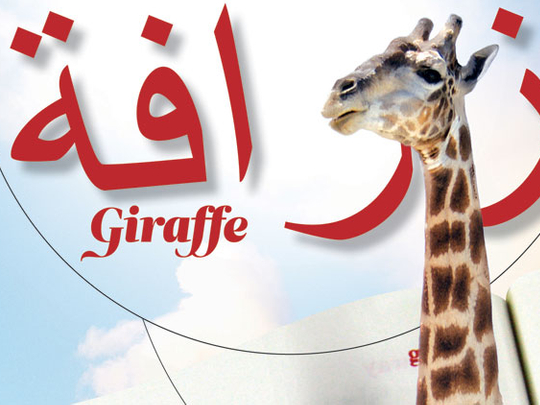
Dubai: What do zero, a giraffe, and alcohol have in common? Not much, other than all these words originate from Arabic, and are part of the huge heritage of language and knowledge that Europe has absorbed from the Arabs over the centuries.
Zero is a version of the Arabic word sifr, and came into English in the 1500s as the concept of a zero made a vast difference to the way people did their arithmetic. Medieval Arabs had not seen many giraffes, which live far to the south in Africa, but the eminent Arab encyclopaedist Al Jawahari included zarafa in his bestiary in the 900s.
Alcohol has been through several transformations before getting to its present inebriating meaning, as it started as al kohl, the fine powder used for beautify the eyes, and then entered Latin in the 1200s as referring to any finely ground material, and then shifted to include an additional meaning of a purified material, or ‘quintessence’ which medieval alchemists (another Arabic loan word!) achieved through distillation, giving its final and modern meaning.
Most of these words came into European languages in the medieval period, as the emerging sophistication of pre-Renaissance Europe borrowed a mass of ideas and concepts from the centuries-old Muslim societies of the Levant, with the Arab Moors in Spain playing a very important role in transmitting documents and books to the thinkers in Europe.
This history means that Arabic loan words in English tend to be in specific categories: for example, there are many scientific terms which come from the deep understanding of these topics written up by the Arab writers of the 800s and 900s. These include words like chemistry (al kimiya), algebra (al jabra), as well as astronomical terms like azimuth (al sumut), nadir (nazir), and zenith (samt al ras), as well as the names of several stars, like Aldebran (al Dabaran, the Follower), and Altair (al Ta’ir, the Flying Eagle) .
A whole range of words come through the maritime dominance of Arab sailors, whose skills were picked up by the early Portuguese and Spanish mariners as they set out to explore beyond the shores of Europe. So words like admiral (amir al bihar – Commander of the Seas); carrack, which is believed to be taken from qaraqir, which is the plural of qurqur, the Arabic for a merchant ship; and magazine, in its meaning as a storehouse, which comes from the Arabic khazan, to store with the prefix ma- which indicates a word of place.
Food and cookery is another large area of transfer of words, as medieval Europe was desperate for the variety offered by the exotic foods and spices of the Arab world. So English acquired words like sugar, which came from the Arabic sukkar, although that in its turn came from further east from a Sanskrit word sharkara. The first reference in English to sugar seems to be in the account books of an abbey Durham in north England, where a shivering scribe recorded the words zuker marok, (Moroccan sugar) in 1302.
Other foods include artichoke (al kharshuf) and apricot (al birquq) although the modern influx of all sorts of overt Arab food like hummus, tahina, and kebab make finding Arabic food in a European supermarket much easier than it would have been in Durham in the 1300s.
Other modern influxes have come from the hundreds of thousands of English servicemen who served in Cairo and the Middle East theatre in the Second World War, and in what was the Crown Colony of Yemen in the 1950s and 1960s. There soldiers learnt to ‘take a shufti’ when they wanted to look at something, coming from the Arabic shuf meaning to look. Indeed, many of the soldiers probably wanted to take a shufti at the bints, which in Cairo in the 1940s meant the less respectable ladies who they might have met on the pavements of that lively city, but bint in Arabic actually just means ‘girl’.
But these modern words are following a much older tradition of borrowing directly from Arabic. Orientalist art and literature in the 1700s and 1800s brought a fascination with the exotic, led by people like the Prince Regent who started his Indo-Saracenic Brighton Pavilion in 1787. These meant that words like harem, henna and hookah became accepted as English words in fairly direct transliterations into English, as fashionable writers and artists started to glorify what they saw as the exotic splendour of the East.
------------------------------------------------------------------------------------------------------------------
Admiral comes from Amir Al Bihar, meaning Commander of the Seas, which was a first title used in Norman Sicily. The ‘D’ was added in Elizabethan England, by court officials ignorant of Arabic. The French still use amiral.
Giraffe was known to the Arabic lexicographer, Al Jawahiri, as Al Zarafa, which he rather briefly dismissed as “a type of creature’. Later biologists linked the name more firmly to the long-necked beast of Africa which we all know today.












